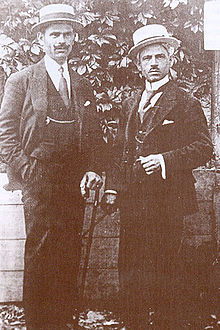This article includes a list of general references, but it lacks sufficient corresponding inline citations. (March 2014) |
Yanaki and Milton Manaki | |
|---|---|
| Ienache (Yanaki) and Miltiade (Milton, Miltos), Manachia (Manaki)[1] (Aromanian) | |
 | |
| Born | Yanaki - 18 May 1878, Milton - 9 Sep 1882 |
| Died | Yanaki - 1954 Thessaloniki, Greece Milton - 1964 Bitola, SR Macedonia, Yugoslavia |
| Occupation(s) | Filmmakers, photographers |
| Years active | 1905—1964[2] |
The Manaki brothers (Aromanian: Frats Manachia), Yanaki and Milton (Ianachia and Milton), were two Aromanian photography and cinema pioneers within the Balkan Peninsula and the Ottoman Empire. They were the first to bring a film camera and create a motion picture in the city of Manastir (modern-day Bitola, Republic of North Macedonia), an economic and cultural center of Ottoman Rumelia.[2] Their first film, The Weavers, was a 60-second documentary of their grandmother spinning and weaving;[3] this is regarded as the first motion picture shot in the Balkans.[4] The Manaki brothers used a 35 mm Urban Bioscope camera that Yanaki imported from London in 1905.[5] Yanaki and Milton filmed documentaries about various aspects of life in the city of Manastir.[6]
They made a name for themselves in their local photography studio and, in 1906, they received an invitation from King Carol I of Romania to participate in the Bucharest Jubilee Exhibition, where they won a gold medal for their collection and were asked to be the King's official photographers.[7] They became the official photographers of the Ottoman Sultan and the King of Yugoslavia Alexander Karađorđević, in 1911 and 1929, respectively.[8] In 1921 they built an outdoor cinema named Manaki and later transformed it into a movie theater, which was destroyed by a fire in 1939.[9]
The National Archive of North Macedonia preserves more than 17,000 photos and over 2,000 meters of movie film from the brothers Manaki.[10] The brothers documented a number of historical events—the Ilinden Uprising, the Balkan Wars, World War I, and the development of Manastir as a consulate and military center of the Ottoman Empire.[6] They left a rich legacy of important documentary value of the historical and cultural development of Southeast Europe. In their honor the Manaki Brothers Film Festival is held every year in North Macedonia.[11]
- ^ Manakia Bros: Pioneers of Balkan Cinema, Claimed by Six Nations, Marian Tutui, Romanian Film Archive.
- ^ a b Evans, Thammy (2012). Macedonia. Bradt Travel Guides. p. 207. ISBN 9781841623955.
Manaki.
- ^ Filmland Griechenland - Terra incognita: griechische, Elene Psoma, Logos Verlag Berlin GmbH, 2008, ISBN 3832516182, S. 23. (Ger.)
- ^ Katerina Zacharia, "'Reel' Hellenisms: Perceptions of Greece in Greek Cinema" in Katerina Zacharia, Hellenisms, p. 323
- ^ "Vecer Online - One century of the Macedonian seventh art" (in Macedonian). Archived from the original on 21 February 2013. Retrieved 19 June 2013.
- ^ a b "Utrinski Newspaper - Archive monument from the creation of the Manaki's". Archived from the original on 22 February 2014. Retrieved 19 June 2013.
- ^ "In 1906 the brothers participated in a big exhibition in Romania, from where they return with a golden medal"
Makedonska Nacija - Biography of Milton Manaki. (in Macedonian) - ^ Po povod Manaki, Tomislav Osmanli, Skopje, 2006, page 27
- ^ "Loza - article on the "Cinema of the Brothers Manaki"" (in Macedonian). Archived from the original on 21 February 2014. Retrieved 19 June 2013.
- ^ Journal of Film Preservation, page 27 Archived 2013-11-26 at the Wayback Machine
- ^ The official website of the festival in Macedonian and English.